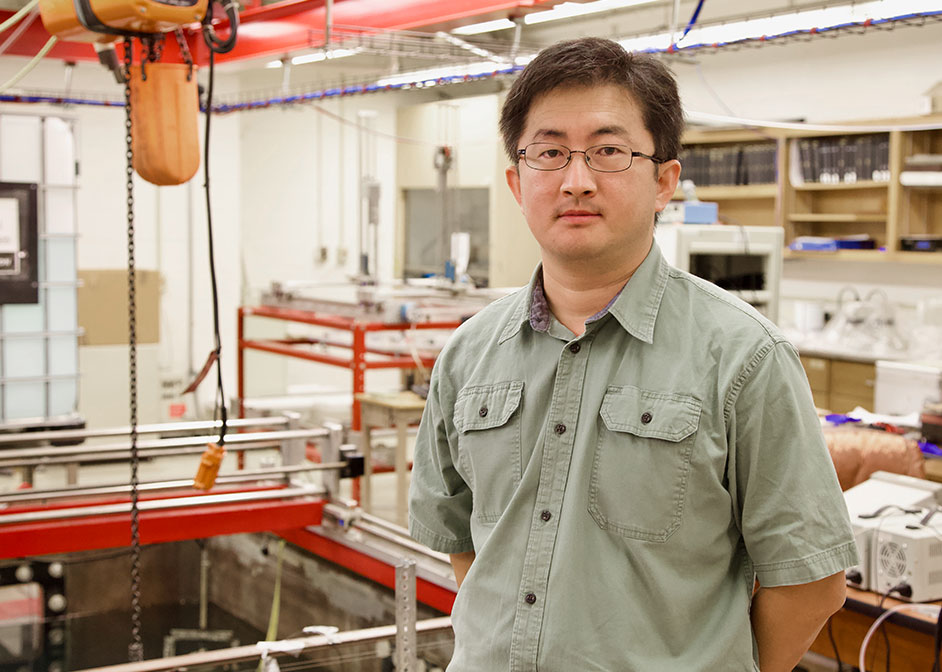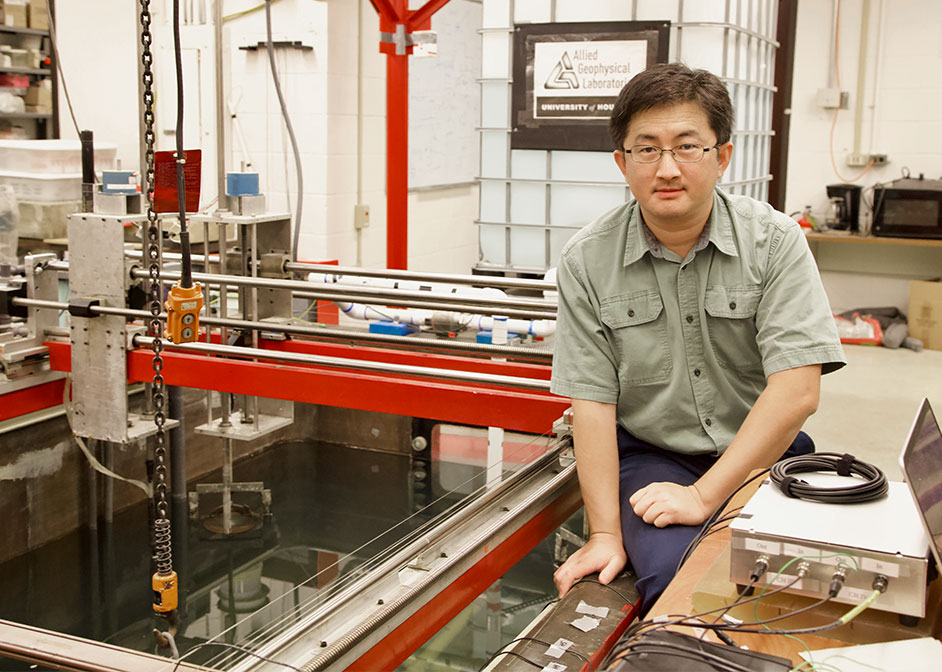Associate Professor Honored to Receive Professorship Named After Philanthropic Couple
Yingcai Zheng, associate professor of seismic imaging at the University of Houston, has been named a Robert and Margaret Sheriff Professor in Applied Geophysics.

Zheng was chosen for his outstanding research, high stature among his peers in the field of applied geophysics and for his service to the Department of Earth and Atmospheric Sciences and College of Natural Sciences and Mathematics.
The professorship is named after Robert Sheriff, a former professor of geophysics at UH, and his wife Margaret Sheriff. The two were enormous benefactors of the department, donating nearly $2 million, establishing five endowments.
“It’s a tremendous honor for me,” said Zheng. “First, I thank the Sheriff family for creating this endowed professorship. I also thank the department and the dean. It is a major responsibility to carry Robert Sheriff’s ideas and legacy forward.”
Robert Sheriff had a prestigious career both at UH and in industry. In the geophysics community, he may be best known for writing the Encyclopedic Dictionary of Applied Geophysics, which has sold thousands of copies. At Chevron, he worked in different cities around the world, sharing the experience with his family.
Sheriff cared deeply for his students. With his wife Margaret, he set up a scholarship through the Society of Exploration Geophysicists for international graduate students coming to UH to study geophysics.
“He always pushed the science,” said Tom Lapen, earth and atmospheric sciences department chair. “He always cared for his students. He always cared for the department. He tried to build people up.”
Lapen adds he is extremely proud of Zheng who, every year, adds responsibilities to his role as a scientist and as a faculty member of the department.
“He tries to make EAS a better place by engaging in department initiatives,” said Lapen, “whether that’s through participating with our diversity initiatives or pushing his students to do the best they can. He really is just at the top of his field.”
Geothermal and Seismology Research
Zheng has a wide variety of research interests. Currently, his research group is funded by three grants, two from the National Science Foundation, the third from the Department of Energy.

The DOE grant funds his geothermal energy exploration research. Zheng’s goal is to reduce the cost of geothermal exploration by using surface seismic data to look for permeable zones in the earth for drilling to mine the heat source. He does this through machine learning and artificial intelligence techniques to help him and his team find faults and fractures in the rock.
A recent NSF grant funds study of deep earthquakes that are about 60 to 700 kilometers or about 37 to 435 miles beneath the Earth’s surface in subduction zones, where tectonic plates meet. In 2018, his research group found that when the earthquakes occur in subducting slabs, they are hosted in highly anisotropic or fine layered rock fabric. A tectonic plate that is pushed underneath is known as the subducting slab. Most recently with this funding, the group is investigating the consequences of anisotropy and the relationship to the global carbon cycle in the deep earth.
The other NSF project focuses on earthquake triggering, which is a phenomenon that occurs when seismic waves of a larger earthquake, after traveling thousands of miles, trigger smaller earthquakes. He found an incoming wave could amplify the fluid pressure in a fracture more than 100 times. With his student and collaborator, he built an apparatus to create the pressure surge effect in their lab. If successful, it will allow him to use man-made seismic waves to trigger some small earthquakes to test out his ideas, control fluid flow in reservoirs and image hydraulic fractures.
Zheng hopes to use his new professorship to carry Robert Sheriff’s torch at the university.
“Bob was a giant in our field, and he was a visionary,” Zheng said. “He was talking about horizontal drilling and neural networks almost 20 years ago in his ‘Encyclopedic Dictionary of Applied Geophysics.’”
“He was curious, always learning, a great educator,” he said. “He held lecture tours to teach geophysics all over the world and set up scholarships so foreign students could attend conferences. He had a very full life and cared for the next generation.”
With the resources from the professorship, Zheng said he plans to continue to educate new scientists and promote scientific research from diverse voices.
- Rebeca Trejo, College of Natural Sciences and Mathematics